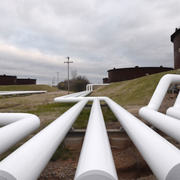
Trump vill ha oljeledning – tänker göra ny bedömning
Planerna på en kontroversiell oljeledning i North Dakota i USA har stoppats efter månader av protester från ursprungsbefolkning och miljöaktivister. Men den tillträdande presidenten Donald Trump vill fortfarande att ledningen byggs. Trumps övergångsteam meddelade efter beslutet att projektet åter ska bedömas när Trump tillträtt i januari.
Dave Archambault, ordförande för Standing Rock Sioux, säger att han hoppas på ett möte med Trump.
– Ingenting kommer att hända den här vintern. Den nuvarande administrationen gjorde det som var rätt och vi behöver utbilda den tillträdande, säger han enligt TT.
bakgrund
Dakota Access Pipeline
Wikipedia (en)
The Dakota Access Pipeline or Bakken pipeline is a 1,134-mile-long (1,825 km) underground oil pipeline project in the United States. The pipeline is being planned by Dakota Access, LLC, a subsidiary of the Dallas, Texas corporation Energy Transfer Partners, L.P. It will begin in the Bakken oil fields in Northwest North Dakota and will travel in a more or less straight line south-east, through South Dakota and Iowa, and end at the oil tank farm near Patoka, Illinois. The pipeline is due for delivery on January 1, 2017.
The $3.7 billion project became public in July 2014, and informational hearings for landowners took place between August 2014 and January 2015. Dakota Access submitted its plan to the Iowa Utilities Board (IUB) on October 29, 2014, and applied for a permit in January 2015. The IUB was the last of the four state regulators to grant the permit in March 2016, including the use of eminent domain, after some public controversy. As of March 2016, Dakota Access had secured voluntary easements on 82 percent of Iowa land.
The pipeline has been controversial regarding its necessity, potential harm to the environment, and effects on climate change. A number of Native Americans in Iowa and the Dakotas have opposed the pipeline, including the Meskwaki and several Sioux tribal nations. In August 2016, ReZpect Our Water, a group organized on the Standing Rock Indian Reservation, brought a petition to the U.S. Army Corps of Engineers in Washington, D.C. and the tribe sued for an injunction. A protest at the pipeline site in North Dakota near the Standing Rock Indian Reservation has drawn international attention in response to the thousands of people who are protesting the pipeline construction and how they have been treated by local and state authorities.
Omni är politiskt obundna och oberoende. Vi strävar efter att ge fler perspektiv på nyheterna. Har du frågor eller synpunkter kring vår rapportering? Kontakta redaktionen



